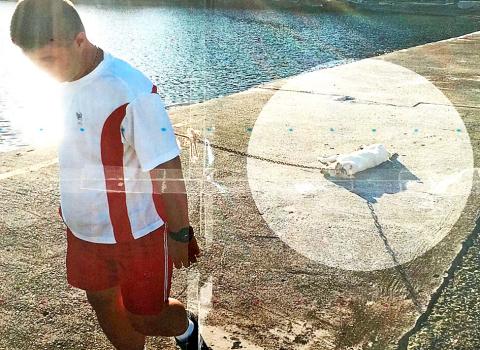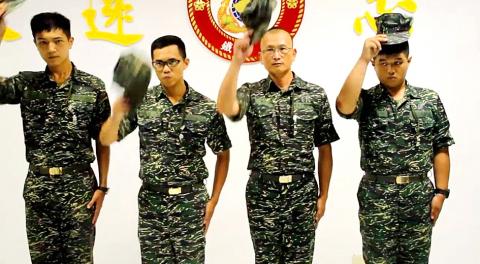The Kaohsiung District Court yesterday found three marines guilty of torturing a dog to death, a violation of the Animal Protection Act (動物保護法), and handed the three men six-month prison terms, which are commutable to fines.
It was the first ruling in the case and can be appealed.
The incident in June last year involved squad leader Sergeant Chen Yu-tsai (陳祐才) and two privates under his command — Chang Feng-yu (張峰瑜) and Hu Chia-wei (胡家瑋) — of the Marine Corps’ Air Defense Group, which is based at Zuoying Naval Base in Kaohsiung.

Photo: CNA
As Chang and Hu admitted to wrongdoing and cooperated during the investigation, the court suspended their sentences and placed them on probation for two years.
In addition to the jail sentences, the court also imposed fines of NT$150,000 on Chen, NT$130,000 for Chang and NT$225,000 for Hu.
The three men’s terms can be commuted to additional fines, at a rate of NT$1,000 per day.

Photo: screen grab from Facebook
An investigation found that there were a number of stray dogs living near the unit’s barracks that were being fed by the soldiers.
Prosecutors said that on June 24 last year, Chen saw one of the dogs, nicknamed “Little White” (小白), wandering in the unit’s exercise yard and reportedly told Chang: “Make Little White disappear, I do not want to see him anymore.”
They added that when Chang asked if that meant killing the dog, Chen told him: “Do what you like, I do not care.”
Chang and Hu then leashed Little White and took him to an embankment near the shore, where they beat the dog with a wooden club and hung him by the leash, prosecutors said.
Chang filmed the incident on his smartphone and circulated the video on social media platform Line among his friends.
One man who was reportedly disgusted by the torture and killing of the animal reported it to local authorities.
News of the incident sparked a public furor.
“Chen was commander of the unit, and his instructions to soldiers to beat the dog to death showed a lack of comprehension about animal protection,” the court said.

Chinese spouse and influencer Guan Guan’s (關關) residency permit has been revoked for repeatedly posting pro-China videos that threaten national security, the National Immigration Agency confirmed today. Guan Guan has said many controversial statements in her videos posted to Douyin (抖音), including “the red flag will soon be painted all over Taiwan” and “Taiwan is an inseparable part of China,” and expressing hope for expedited reunification. The agency last year received multiple reports alleging that Guan Guan had advocated for armed reunification. After verifying the reports, the agency last month issued a notice requiring her to appear and explain her actions. Guan

GIVE AND TAKE: Blood demand continues to rise each year, while fewer young donors are available due to the nation’s falling birthrate, a doctor said Blood donors can redeem points earned from donations to obtain limited edition Formosan black bear travel mugs, the Kaohsiung Blood Center said yesterday, as it announced a goal of stocking 20,000 units of blood prior to the Lunar New Year. The last month of the lunar year is National Blood Donation Month, when local centers seek to stockpile blood for use during the Lunar New Year holiday. The blood demand in southern Taiwan — including Tainan and Kaohsiung, as well as Chiayi, Pingtung, Penghu and Taitung counties — is about 2,000 units per day, the center said. The donation campaign aims to boost

The Kaohsiung Tourism Bureau audited six hotels in an effort to prevent price gouging ahead of Korean band BTS’ concert tour in the city scheduled for Nov. 19, 21 and 22 this year. The bureau on Friday said that the audits — conducted in response to allegations of unfair pricing posted on social media — found no wrongdoing. These establishments included the local branches of Chateau de Chine, Hotel Nikko, My Humble House, and Grand Hai Lai, it said, adding that the Consumer Protection Commission would have penalized price gougers had the accusations been substantiated. The bureau said the Tourism Development Act

BACK TO WINTER: A strong continental cold air mass would move south on Tuesday next week, bringing colder temperatures to northern and central Taiwan A tropical depression east of the Philippines could soon be upgraded to be the first tropical storm of this year, the Central Weather Administration (CWA) said yesterday, adding that the next cold air mass is forecast to arrive on Monday next week. CWA forecaster Cheng Jie-ren (鄭傑仁) said the first tropical depression of this year is over waters east of the Philippines, about 1,867km southeast of Oluanpi (鵝鑾鼻), and could strengthen into Tropical Storm Nokaen by early today. The system is moving slowly from northwest to north, and is expected to remain east of the Philippines with little chance of affecting Taiwan,